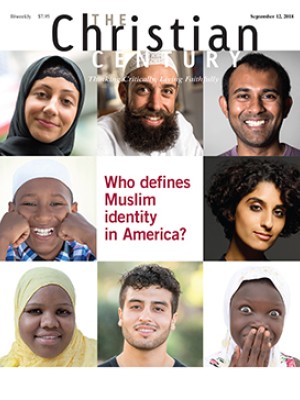October 7, Ordinary 27B (Mark 10:2-16)
Is there any good news in Jesus' teaching on divorce?
I don’t know about you, but I’ve always found this Mark passage on divorce to be one of the most difficult texts in scripture. As someone who grew up with divorced parents and has been divorced, I’ve found it hard to find meaning in this text.
“Is it lawful for a man to divorce his wife?” some Pharisees ask Jesus, trying to trip him up. Moses allows it, they say. In his response, Jesus considers both a man divorcing his wife and a woman divorcing her husband. That sounds good, right? It’s a step toward empowering women and making them more than property. But keep reading: for either a man or a woman, divorce leads to adultery. So it ought not to be done. What’s the good news in this? This is why I’ve avoided this passage. I’ve chosen silence on the topic of divorce rather than trying to wrestle hope out of this text.
Read our latest issue or browse back issues.
But now I hear a subtext of help and hope that I couldn’t acknowledge before. While this passage has been used to condemn those who are divorced, I don’t think this is what Jesus means. I firmly believe that if something isn’t loving (think agape), then it isn’t what Jesus would have us do.
In Jesus’ day, women and children had limited rights. If a man grew tired of his wife, he could divorce her in favor of another, and she had little or no recourse. When Jesus suggests the woman is an equal partner in marriage, there are theological implications. She becomes more than “an object in a transaction between men,” writes Joyce Ann Mercer. “She becomes subject and agent.” By emphasizing a woman’s agency in a theology of relationship, Jesus challenges the idea that a man can simply set aside his wife. Marriage creates a union in which two people participate and are changed, a sacred relationship with mutual responsibility. One person cannot just set the other aside.
By bringing this element of the sacred into his understanding of marriage and divorce, Jesus offers the woman some protection. She can’t be easily discarded by one who claims to be living by the religious laws, not as Jesus interprets those laws. Like the man, the woman has value in God’s eyes—so she should be treated accordingly.
Jesus goes on to include children, too. Children have so much value that they are the ones to show us how to receive the realm of God. If the rest of us don’t know how to be as children before God, we will never enter the realm of God. Jesus challenges those with power and authority to recognize that God’s love isn’t just for men; women and children are also loved by God for who and what they are. More than 2,000 years later, we still have a hard time with this. The truth of divine love continues to threaten those who hold power in this world.
God’s love is a love that liberates. If Jesus sought to protect women and children, then this passage isn’t really about divorce as much as it is about recognizing the imago Dei in everyone, particularly the people society tends to disempower. What God brings together, nothing can separate. This is descriptive, not prescriptive. We cannot simply discard that to which we are bound by the Holy Spirit.
If this passage is about what I think it is, then we as the body of Christ have much work to do. The church, like many other social institutions, has been tangled up in kyriarchy, a term Elisabeth Schüssler Fiorenza coined to describe interconnected social relationships of privilege and oppression. In one area of life an individual may be able literally or figuratively to lord it over someone else, while in another area of life they themselves are oppressed. In the church, while we maintain tradition and build the rungs on the ladder of kyriarchy, we may forget the imago Dei that is inherent in each human being. We build powerful institutions, filled with traditions. Can we leave behind whatever is not rooted in love?
I worry about people all the time, and I try to turn these worrisome thoughts into prayers. I ask God to be with those in our society who are as vulnerable as those ancient women and their children who were viewed as property. I’ve done this so often that I stopped listening for an answer. I just wanted God to do something for people whose humanity is unseen, let alone the divine image within them.
More and more lately, I feel as if the answer that I was running from is that God has already done something for the most vulnerable among us. Didn’t Jesus show us how to love one another? Jesus didn’t reinterpret the law to be contrary or to challenge those with power for fun. Jesus set an example for us to follow and embody. This text that appears to be on divorce is about something so much larger, so much scarier. I am not the only one who has backed away from it.
We have no business treating anyone as if they were not made in God’s image. This text uses a first-century situation to tell us to stop participating in traditions that disempower and destroy human beings and to start living in love. Sometimes that means bending or breaking traditions into the liberating shape of justice, even when doing so threatens our own place in the kyriarchy.





